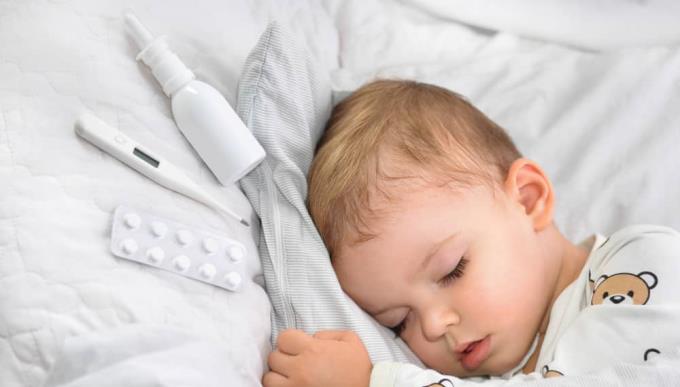Ways to determine an infants caloric needs

Learn how to determine your baby’s caloric needs, including the calories in breast milk and formula, to ensure your infant gets the right nutrition for healthy growth.
A cold is a common illness, especially in young children. Although children with a cold are not very dangerous, the symptoms of the disease are more or less annoying.
There are many ways that a child with a cold can feel better. Find out the information about colds for the prevention and treatment of babies through the article below of aFamilyToday Health.
A cold is the name for an infection of the mouth, nose and throat. Doctors call this the upper respiratory tract. A cold is caused by one of many different viruses. Babies tend to catch colds, as their immune systems are still developing and maturing.
A cold is easily spread when someone is sick and sneezes or coughs, or when a child inhales a virus in the air that can cause illness. A cold can also spread through children's hands while playing. With older children, parents should instruct children to always cover their mouths when coughing, sneezing and wash their hands after blowing their nose or sneezing.

If your child has a cold, he or she may have the following symptoms:
Fever
Cough
Red eyes
Sore throat
Nasal stuffy, runny nose
Anorexia
Uneasy and irritable
Swollen lymph nodes are under the armpits, on the neck, or in the back of the head.
Baby may have difficulty breathing due to a stuffy nose, so feeding can be very difficult. As a child, children cannot blow their nose by themselves, so you must observe and help them clean and remove mucus from the nose regularly.
Your baby may also wake up several times during the night because a stuffy nose is very uncomfortable. Be ready to wake up during the night with your baby, gently pat and clean your baby's nose. Symptoms of the cold will usually go away within 10-14 days, whether or not your baby gets treatment.
Your baby's cold will go away on its own within 10-14 days. You can reduce the discomfort of your child using the following:
Make sure your baby gets plenty of rest
Encourage your child to breathe more. If your baby is formula fed or solid, offer him plenty of fluids. This will help your baby's body retain water
If the child is too young to blow their own nose, parents should clean the baby's nose more often with a rubber tube nasal suction device to help the baby breathe easier.
Taking paracetamol or ibuprofen can help reduce fever. You can give paracetamol to babies from 2 months old if your baby is born full term and weighs more than 4kg. If ibuprofen is used, it applies to babies 3 months or older and weighing at least 5 kg. Check with your doctor or pharmacist if you are unsure of the exact dose your child with a cold is taking
If the baby has difficulty feeding because of a stuffy nose, the mother can use saline to help clear the nose 15 minutes before feeding the baby.
Wind oil can help your baby breathe more easily. You can buy it from pharmacies and apply it to your child's chest and back. Absolutely do not apply in the child's nostrils because it can limit the child's breathing
Steam breathing can help unclog blocked air passages and relieve coughing. Try letting your baby sit in the bathroom for a few minutes with the hot shower running. Do not place your baby too close to hot water, as he may water tears, then dry and change the baby's clothes.
If your child has a stuffy nose without other symptoms, check to see if something is stuck in his or her nose. In addition, parents should not give any over-the-counter cough or cough medicine, especially to a child younger than 6 years old because of the risk of side effects.

If your baby is less than three months old, take your baby to the doctor when he or she shows the first signs of illness. For babies older than three months, you can also take your baby to the doctor to confirm that it's a common cold.
Children with a cold, parents also take their children to the doctor if they find:
Your cold doesn't improve after 5 days
The temperature is over 38ºC if the baby is under three months, and over 39ºC if the baby is under six months old
Baby has a respiratory problem
A persistent cough that persists for many days
Children often rub their ears with discomfort. This could indicate an ear infection
Your baby coughs up green, yellow, or brown phlegm or it comes from the nose.
Breastfeeding is one of the best ways to protect your baby's health. This helps to create antibodies in the baby's blood that help fight infection. This is not the best way to prevent your baby from catching a cold, but breastfeeding is still better against colds and other infections.
Moms can also protect babies by keeping them away from people who have coughs or colds or asking them to wear a mask and wash their hands well before handling or touching baby's belongings.
If one parent smokes, it's best to quit and don't let your child go to areas where someone is smoking. Children living with smokers have more colds and longer lasting illnesses than children who are not commonly exposed to cigarette smoke.
Learn how to determine your baby’s caloric needs, including the calories in breast milk and formula, to ensure your infant gets the right nutrition for healthy growth.
Discover the top 5 smartest dog breeds in the world, including Border Collie, Poodle, German Shepherd, Golden Retriever, and Doberman Pinscher. Learn about their unique traits and why they are considered the most intelligent dogs.
Discover 7 nutritious and delicious ways to cook egg porridge for babies, including recipes with cheese, pumpkin, tomato, and more. Learn how to prepare baby-friendly egg porridge with our expert tips.
After a series of medical measures they obtained a complete human vascular system profile.
Watermelon is one of the fruits that many people love, not only cheap but also delicious, nutritious and refreshing in the summer. To get delicious watermelon pieces, show off your housewives, your artistic talents to cut beautiful pieces of watermelon.
aFamilyToday Health - The digestive system and body in each baby is different. Parents need to recognize notes to deal with when babies have a food allergy!
Babies need many factors for perfect development. aFamilyToday Health shares with parents things to keep in mind when babies are 8 weeks old so that parents can take care of their babies the best!
Babies need many factors for perfect development. aFamilyToday Health shares with parents things to keep in mind when babies are 18 weeks so that parents can take care of their babies the best!
Babies need many factors for perfect development. aFamilyToday Health shares with parents things to keep in mind when babies are 28 weeks old so that parents can take care of their babies the best!
Babies need many factors for perfect development. aFamilyToday Health shares with parents things to keep in mind when babies are 32 weeks old so that parents can take care of their babies the best!








